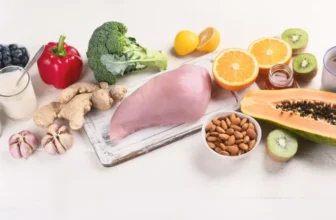
When it comes to promoting gut health and overall wellness, certain foods can play a significant role in maintaining a balanced and thriving digestive system. Incorporating probiotic-rich options like yogurt and fermented foods, as well as high-fiber choices such as fruits and whole grains, can help support a healthy gut environment. But what about the lesser-known foods that can also positively impact your gut health? Stay tuned to discover some surprising additions to your diet that can contribute to a happier digestive system and overall well-being.
Probiotic-Rich Foods
If you want to improve your gut health, include probiotic-rich foods in your diet. These foods are packed with beneficial bacteria that can help balance your gut microbiome and support digestion.
Yogurt is a popular choice, but make sure to opt for varieties that contain live and active cultures. Kefir, a fermented milk drink, is another excellent source of probiotics that can contribute to a healthy gut. For those who prefer plant-based options, kimchi and sauerkraut are great choices. These fermented vegetables not only add flavor to your meals but also provide a dose of probiotics.
Incorporating miso into your diet is another way to introduce probiotics. This traditional Japanese seasoning made from fermented soybeans can be used in soups, marinades, and dressings. Additionally, pickles made through the process of fermentation can also be a tasty way to boost your probiotic intake.
High-Fiber Options
To optimize your gut health and promote overall wellness, consider incorporating high-fiber options into your daily diet. High-fiber foods play a crucial role in supporting a healthy digestive system by promoting regular bowel movements, feeding beneficial gut bacteria, and reducing inflammation. Including a variety of high-fiber options such as fruits, vegetables, whole grains, legumes, nuts, and seeds can help improve your gut health and overall well-being.
Fruits like berries, apples, pears, and bananas are excellent sources of soluble fiber, which can aid in maintaining healthy blood sugar levels and cholesterol. Vegetables such as broccoli, Brussels sprouts, and artichokes provide insoluble fiber that adds bulk to your stool and supports regular bowel movements. Whole grains like oats, quinoa, and brown rice are rich in fiber, promoting satiety and aiding in digestion.
Fermented Foods
Incorporating fermented foods into your diet can further enhance your gut health and overall well-being. Fermented foods are rich in probiotics, which are beneficial bacteria that support your digestive system. Some common examples of fermented foods include yogurt, kefir, sauerkraut, kimchi, and miso. These foods undergo a fermentation process that breaks down sugars and carbohydrates, making them easier for your body to digest.
Probiotics found in fermented foods can help balance the bacteria in your gut, promoting a healthy microbiome. A diverse and balanced microbiome is essential for good digestion, nutrient absorption, and even immune function. By including fermented foods in your diet, you can introduce a variety of beneficial bacteria that contribute to these processes.
When choosing fermented foods, opt for options that are minimally processed and contain live active cultures. These cultures are what provide the health benefits associated with fermented foods. Including a variety of fermented foods in your diet can help support a thriving gut ecosystem and improve your overall wellness.
Anti-Inflammatory Choices
Consider adding anti-inflammatory choices to your diet for improved gut health and overall well-being. Including foods that help reduce inflammation can have a significant impact on your digestive system and contribute to a healthier gut.
Turmeric, for example, is a powerful anti-inflammatory spice that can easily be incorporated into your meals. Its active compound, curcumin, has been shown to help reduce inflammation in the gut and promote better digestion. Adding turmeric to soups, stews, or smoothies can provide both flavor and health benefits.
Fatty fish like salmon, mackerel, and sardines are rich in omega-3 fatty acids, which have strong anti-inflammatory properties. These healthy fats can help reduce inflammation in the gut lining, improving overall gut health. Including fatty fish in your diet a few times a week can be a delicious way to support your gut.
Berries, such as blueberries, strawberries, and raspberries, aren’t only tasty but also packed with antioxidants that help combat inflammation. Adding a handful of berries to your breakfast yogurt or oatmeal can be a simple yet effective way to introduce more anti-inflammatory foods into your daily meals.
Best Sellers














